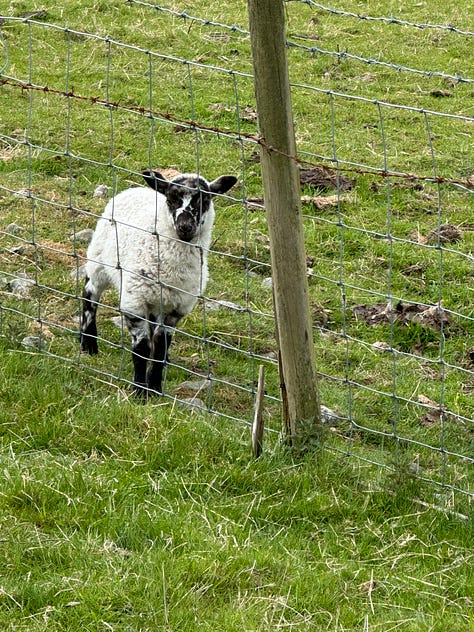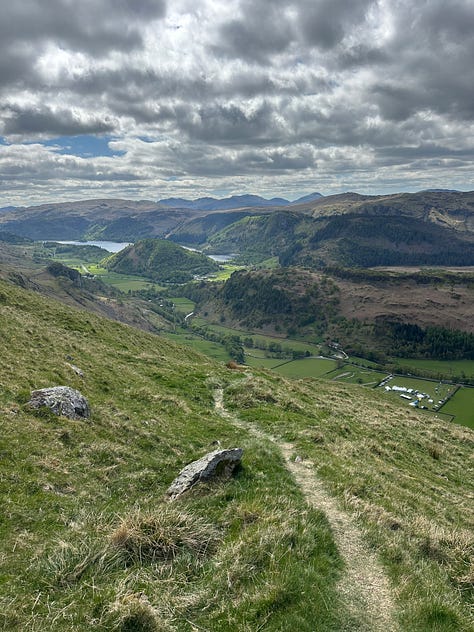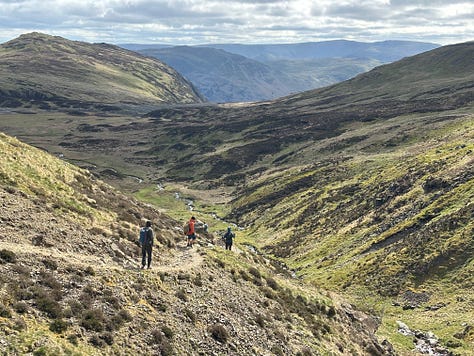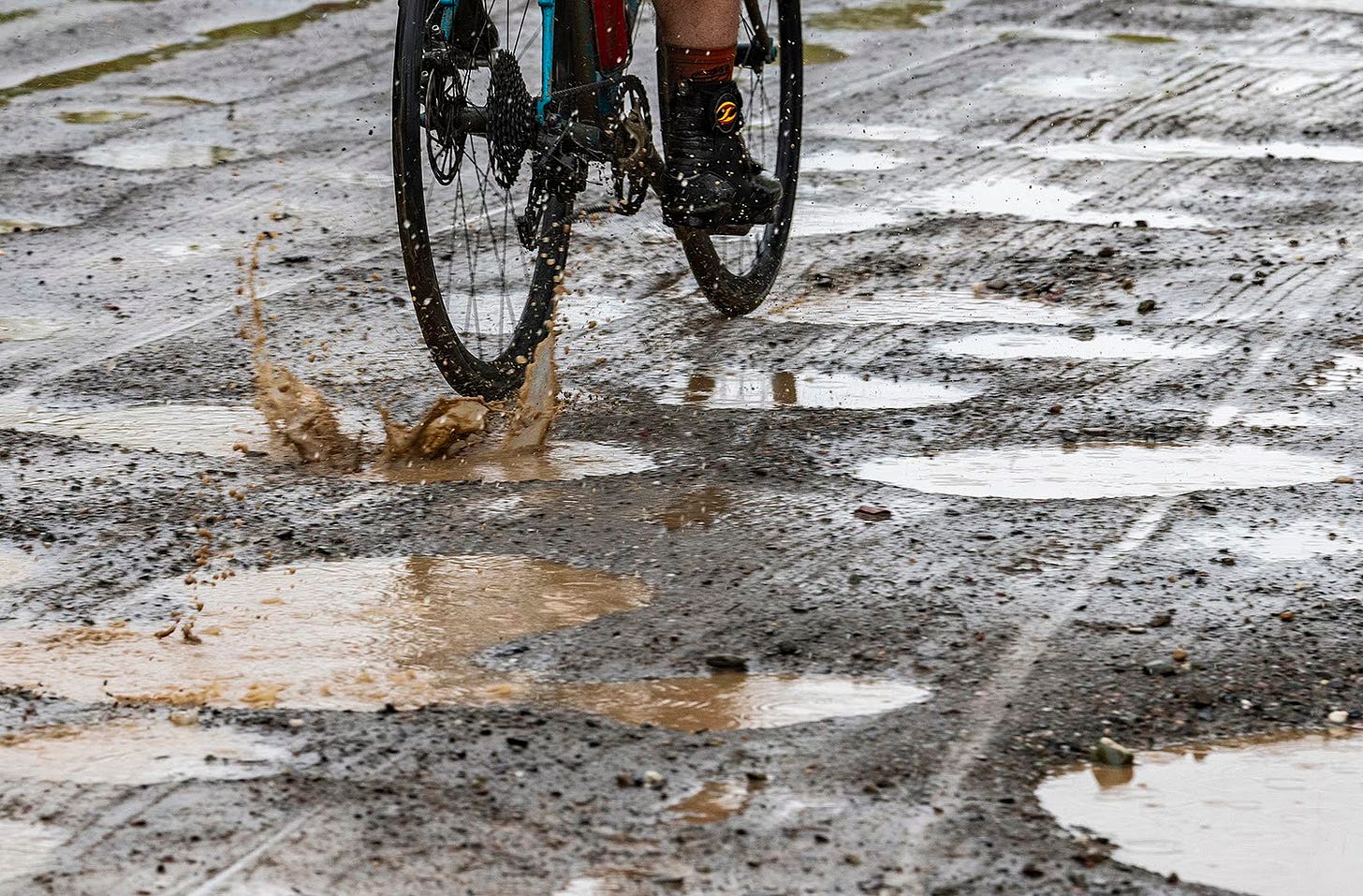I have two tales to tell from my experiences in the last few weeks. One is full of good news. The other ends well, but not before some trials and tribulations. Guess which one makes the better story.
The happy story is this: my husband and I and a group of friends arrived in England during a record-setting warm spell. We were bathed in sunshine for virtually all of our ten days there. Crucially, and very fortunately, the good weather extended to the entirety of the Scarpa Great Lakeland 3Day event that had brought us there in the first place. The Lake District was its usual beautiful self; the lambs were adorable; the base-camp food and beer was hearty; the checkpoint-to-checkpoint routes were varied and scenic; everyone in our group was delighted and in fine spirits; my broken-down knee even hurt less with each day, and there were some grassy, long downhills that offered probably the most exhilarating running I’ve ever done in my life. Yay!



The other story takes place in upstate New York, just over the Vermont border and involves a cycling event now called simply “Battenkill”—because of copyright and ownership issues that have removed from its name the fact that it is a tour of said river. Years ago, I entered this event in its shortest form of 21 miles, while my husband and our friends completed the full 78-mile route. Over the years, I’ve done the 78-miler, too, though every year I am reminded that it’s going to go better for me if I simply remember to, ahem, actually train on the bike before the day.
This year, the full distance was 62 miles but my husband and I opted for the 42-miler, in deference to the fact that we’d have been off our bikes for two weeks prior, and would be better off with this medium distance.
On the day, we had thoroughly English weather. Every nasty meteorological condition we could have had in the Lake District came and sat over Cambridge, NY and environs all day Saturday. Rain, heavy at times (as they say), plus a temperature of 46 degrees, and muddy roads, including a good ten miles of dirt.
I made some tactical errors in clothing selection—not only in what I brought to our friends’ house that weekend, but also in what I chose on race morning. I opted not to wear a fully waterproof jacket, in favor of one that offered cycling pockets in the back. (The pockets proved useless because my hands became too numb to extract any nutrition from them.) I had only ankle socks. I had only fingerless gloves—having brought my waterproof cycling gloves to ENGLAND as part of the required equipment, but not for the bike ride.
Suffice to say that within minutes of the start, I was soaked through, my hands and feet were well on their way to the this-must-be-an-inanimate-object feeling of numbness, and my legs—only fortuitously covered in compression tights I’d brought with me for after—were freezing. On the plus side, it was raining so hard that I was literally (and I’m using this word the correct way here) drinking rain water from my helmet. So at least I was kind of hydrated.
Three and a half hours, 4,000 feet of elevation gain, and 46.5 miles (we missed a turn) later, I crossed the finish line, stood there for a few seconds, dropped my bike, and headed straight for the medical tent. I had lost my race against hypothermia.
I’ve always been afraid of getting hypothermia. I seem to get cold easily—a byproduct of the fact that I sweat like crazy during sports—and I’ve had frostbite a few times. So, I fear that, once deeply cold, I’ll easily tip over into a more dangerous form of the condition. Well, now I know what that’s like! My particular case required heat packs applied to my chest and back, space blankets and a wool blanket. A medic went out and located my husband, he brought a hot beverage and donuts, and—most importantly—dry clothes. You haven’t lived until you’ve stripped naked in a medical tent with a makeshift screen held around you to give you privacy from the patient suffering from a broken collarbone. Apparently, my breathing rate was high enough for the medic to tell my husband I was “in distress”, though thankfully I was safe from the next stage of hypothermia when your respiration rate goes really low.
It took me a full 48 hours before I really felt recovered—not from the cycling, which actually felt fine, but from the deep fatigue of having spent hours shivering uncontrollably, both on the bike and off it. My adventure taught me the hard way that, thankfully, at least mild hypothermia can be quickly treated and dealt with. I learned, too, not to be casual with my clothing decisions. Just because I’m not out in the Lake District on some mountain top, that doesn’t mean I can be cavalier about how I equip myself. I am chastened, and I am now wiser.
Notice how swiftly I told the happy story, and how much longer I took to tell the story that includes my trials and tribulations. That’s because the happy story has no drama. It’s just lovely. Only lovely, nothing more. The other story has drama (well, I gave it drama!). The other story is, I think, more interesting to read, because it has its pitfalls, it raises questions (will she make it? surely yes because she’s writing this damned Substack!), and its ending offers the payoff of the protagonist’s lesson learned.
For those of us who are storytellers—and aren’t we all, every single one of us who has ever spoken to another human being?!—this is something to ponder. The act of telling another person about a problem makes a greater connection than simply telling that person a success. When we hear a happy story, it’s nice but what can we really say about it? When we hear a sad story, or a story about a challenge, we can all empathize. Even if it’s not our challenge, we know from challenges. We can relate. And we do.
I’ve read somewhere that supposedly the real test of a relationship is how well you respond not to your partner’s setbacks, but to their successes. To respond to a tale of success takes little effort. Yay that’s great congratulations so happy for you. You don’t even have to be specific. To respond to a tale of difficulty, you can’t fake it. You have to be all in.
The tale of difficulty engages its listener because it introduces questions, uncertainty, unease. When I’m talking to students about writing, I often borrow from an article I read once about running form, in which a physiologist explained that a run is a series of arrested falls. You lift one foot, enter into imbalance, tip forward, and catch yourself with the other foot. And so on and so on and so on, forward as you go. Similarly, the tale of difficulty moves forward because it’s propelled by uncertainty, by imbalance. The listener is always in a position of suspense (ha! literally!), waiting (again ha!) for the other shoe to drop.
So, while it’s certainly more enjoyable to have the kind of rain-free, cheerful weekend we all had in the Lake District two weeks ago, it doesn’t make nearly as good a story as “How I got hypothermia during a bike race and learned my lesson about how to dress.”
I hope you don’t have hypothermia stories of your own, but tell me your thoughts on this most Tolstoyan question: can happy stories be unique and interesting, or must there be bad news?






I think a happy story works *only* if there's a little bit of chaos / messiness / misunderstanding along the way.
So glad you are ok!!!